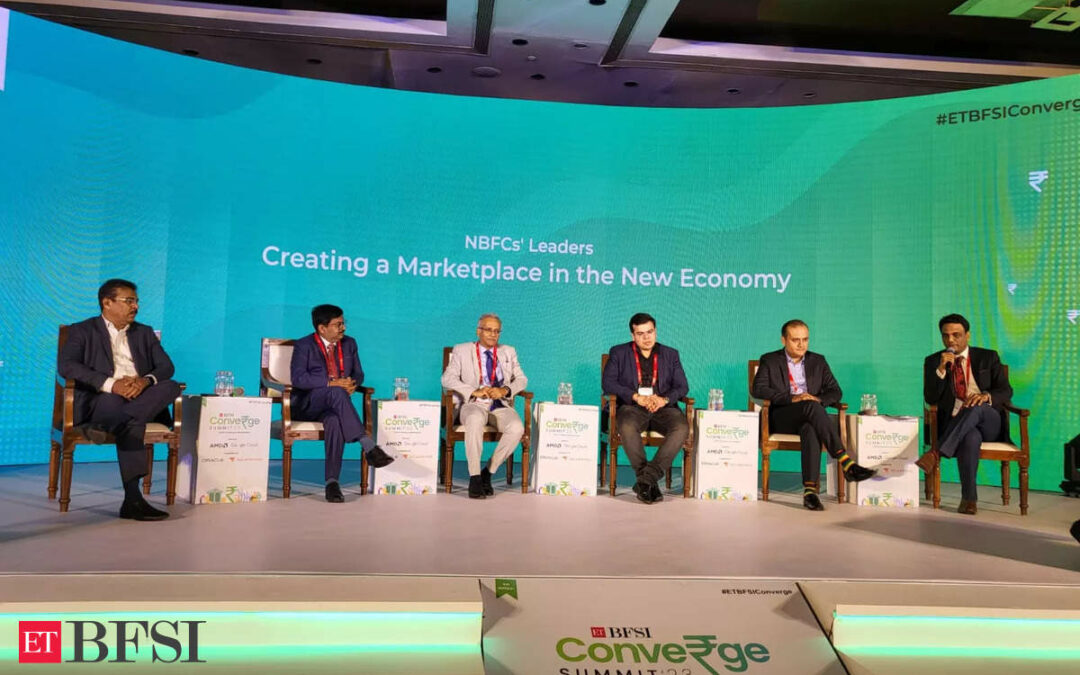Non-banking finance company honchos have stressed on the importance of agility, data integration, and collaboration as key strategies for thriving in India’s rapidly changing lending marketplace.
At a panel discussion at the ETBFSI Converge Summit, leaders of India’s top NBFCs deliberated on the dynamic marketplace in India, experiencing shifts in consumer preferences, the increasing importance of data ecosystems, and the necessity for financial institutions to remain agile and collaborate with fintech companies to succeed in the evolving marketplace.
Umesh Revankar, Executive Vice Chairman of Shriram Finance, said there is a stark difference in demand post Covid with home demand and size of home demand going up, vehicle sales going up, and lenders need to be prepared for the change in demand.
“From 30 years back to now many things have changed, the difference is quite stark. A new ecosystem gets developed, the purchasing pattern has changed totally, he said.
He also highlighted the challenge of customer retention, underlining the necessity to retain customers fully rather than partially. “Challenge is retaining customers completely, you can’t retain half of the customer, you need to retain full of the customer, and companies are working towards it.”
Silent marketplace
Shachindra Nath, VC & MD of U GRO Capital, delved into the concept of the “silent marketplace.” Describing Amazon e-sellers, Havells’s suppliers or GST payer base as examples of marketplaces, Nath discussed how this new marketplace consists of multifaceted data ecosystems, and lenders are now integrating into them to gain insights.
“The biggest change that has been happening is the creation of a silent marketplace. The new marketplace is a multi-faceted data ecosystem, as lenders we try to integrate into each one of them and see what data tells us. Thousands of silent marketplaces are being created, and as lenders, we should be nimble and be ready to integrate with them and provide credit solutions,” said Nath.
He emphasised the critical elements required for lending to business customers: “Lending requires three things for business customers, the intent of the customer, eligibility, and the ability to repay.”
Manish Jaiswal, MD & CEO of Poonawalla Housing Finance, emphasized the recent wave of employment generation and the significant role of fintech companies in shaping the market. He predicted substantial digitalization through fintech collaborations.
“There’s a new wave of employment generation which has triggered into motion. With fintechs, they’ve been massive acquirers, always consumer-focused, and while some of them will, of course, peter out, some will last as they’ve been credit-tested. There’s going to be massive digitalisation with fintech collaboration.”
He also pointed out that India’s spend per capita has not seen significant growth, with the focus shifting towards disposable income per capita adjusted for inflation in the next 10-15 years driving India’s consumer economy.
Credit-based economy
Rishabh Goel, Co-Founder & CEO of Credgenics, highlighted India’s traditional savings mindset and the rise of Buy Now, Pay Later (BNPL) options, transforming the nation into a credit-based economy. He emphasized the importance of fintech collaboration to expand wallet share.
“We have a savings mindset by default in India. BNPL is an induced consumption, ease and convenience have increased. It’s a credit-based economy today. It’s best for fintechs to collaborate; it helps both companies increase their wallet share.”
Ratish Menon, Regional VP of Salesforce, closed the discussion by emphasizing the role of technology transformation, led by digital transformation. He underlined the importance of enhancing customer experiences and providing faster loan processing.
“Technology transformation has been led by digital transformation. Covid brought in a digital explosion in nature. We try to keep the customer in the center and we’re enhancing their experience, providing them faster loans.”











